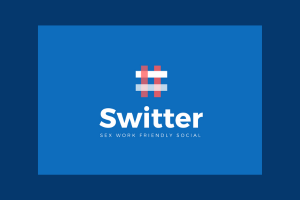Switter Meets its Demise at the Hands of Anti-Free Speech Legislation
 Switter, the Australian online social media platform founded in early 2018 as a haven for adult content, announced that they have no recourse but to shut down the site permanently on March 14 due to anti-sex work and anti-LGBTQIA+ legislation that makes it impossible to do business.
Switter, the Australian online social media platform founded in early 2018 as a haven for adult content, announced that they have no recourse but to shut down the site permanently on March 14 due to anti-sex work and anti-LGBTQIA+ legislation that makes it impossible to do business.
The site was the brainchild of a group of four friends who called themselves Assembly 4. In collaboration with sex workers and technologists, they created Switter in response to the short-sighted anti-sex trafficking law SESTA/FOSTA (Stop Enabling Sex Traffickers Act/Fight Online Sex Trafficking Act) which caused real harm to freedom of speech, put sex workers at risk, and ironically made it more difficult to prosecute and find sex traffickers.
In a nutshell, the act put the impossible burden of policing for abusive content on the publisher’s shoulders. It poked holes in Section 230 causing widespread fear in providers who were now facing legal ramifications if they chose to post adult content. Sites that supported the industry, were now unwilling to put themselves at risk due to extreme penalties and sex workers found it even more difficult to do business on the internet. As reported on by The New Republic: “If SESTA/FOSTA was meant to associate sex workers with sex allegations of sex trafficking, leading platforms to refuse them service out of fear of increased legal risks, and in turn marginalizing and stigmatizing sex workers it was a tremendous success.”
With so many in the adult industry being kicked off sites, Switter was a heroic attempt by Assembly 4 to make things right for sex workers. Switter’s mission statement was clear:
“Access to online platforms reduces the risk of violence for over 42 million sex workers worldwide. FOSTA/SESTA took these away, we’re here to bring them back.”
Switter ran on the open-source software called Mastodon which is community-owned and gives the power to the creator. No one can touch us now! Right? Wrong. It only took a few months for problems to start. First, Switter’s hosting company, Cloudflare, dropped them. Cloudfare cited termination of service because of the FOSTA laws.
Switter’s programmers switched to a new content delivery network, and they were up and running again. A DDoS attack (a malicious cyber-attack targeting a server to disrupt traffic) followed and they got over that as well. Switter continued to grow and within a mere ten months of launching, it had amassed 200,000 users with over 5.5 million statuses posted. Things seemed to be progressing, but ultimately Switter met its demise when it could no longer keep up the relentless fight against anti-free speech legislation.
Originally Assembly 4 had hoped since it was an Australian site, that they would be immune to SOSTA/FOSTA laws in the USA. For a few years they were able to keep their head above water. Unfortunately, in 2021, Australia threw their own muscle into the game with The Online Safety Act (similar to FOSTA) which heavily fines platforms for content that is “likely to cause offence to a reasonable adult.” That of course, could be anything, making it very risky to do business in the adult content space.
The next blow was the reintroduction of America’s EARN IT ACT (a horrendous piece of legislation which made companies again liable for user-generated content) and the UK’s Online Safety Bill in which publishers were gifted the burden of verifying every user’s age and removing harmful or illegal content. The bill slaps them with strict fines and blocked access in the UK if anything slips by.
Switter finally had to admit defeat. In a statement released by the owners, you could almost feel their exhaustion: “Over the years, Assembly Four has engaged with various regulatory bodies, including but not limited to the Australian eSafety Commission, via submissions, consultations and public callouts of harmful and abhorrent behaviour. Every time we have tried to engage with these bodies, we and other human rights groups are dismissed and gaslit by policy makers in government, private industry and not for profits who have a vested financial interest in the ever expanding industry of carceral techno-solutionism.”
“Carceral techno-solutionism” refers to trying to solve real-world problems via technology and in the inability to do so, punishing the providers. Publishers become the scapegoat for difficult issues that cannot be solved online and are victims of harmful feel-good legislation.
The closing of Switter is a sad day for net-neutrality, freedom of speech and especially the adult industry and sex worker community – not only for the millions who could’ve benefitted from the site, but the hundreds of thousands that are currently users and will now be displaced. This faulty and dangerous legislation aiming to stop sex trafficking and regulate adult content does nothing to solve the problem, but disenfranchises and puts a whole industry at risk.











